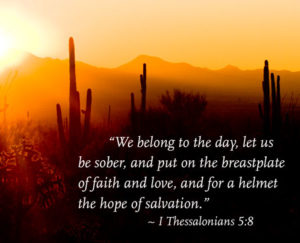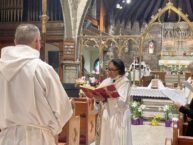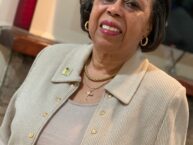 November 19, 2017: May God’s words alone be spoken, may God’s words alone be heard. Amen.
November 19, 2017: May God’s words alone be spoken, may God’s words alone be heard. Amen.
This past Friday, I was a panelist at the 17th Annual American Conference on Diversity Issues in Higher Education. The title of the conference was “Making Meaning of Today’s Cultural Climate.” This title should be enough to given anyone pause about participating – trying to make meaning of what is going on today, right? The breakout session in which I was a panelist was titled “How Do We Create Inclusive Communities?,” and I was there to speak about the Vigil For Love Against Hate that our church put together in response to the horrific shooting in the Pulse nightclub in Orlando last year.
One of the things that I heard other panelists and participants say was along the lines of “we can’t just preach,” or “preaching isn’t enough.” So much so, that it could make a preacher like me feel a little useless, but I knew what they were getting at, and it is much like what Jesus is talking about in this second of three parables we will hear in these first three weeks of Advent.
Advent begins, as we have talked about before, with an eschatological focus – a big seminary word for the end times. As you can see, these readings are much like the one we always get on the first week of the modern four week Advent. Advent – whether four or seven weeks – always starts this way. We just ignored these as being Advent readings for the past several centuries, but that is exactly what they are.
And, these parables that Jesus tells feature a theology of the time in which the bible was developed, in which there would be a future when Jesus would return and judgement of those who are good or wicked would put some in heaven, and others in hell. As I said last week, this puts too much focus on some future Jesus while ignoring the Christ that is present with us here – and frankly, I think it is a bunch of nonsense, and goes against the grain of what Jesus emphasized in his ministry – that the Kingdom of God is now, not in some far off future. Nevertheless, the parable does have a rich meaning for us – regardless of whether one ascribes to this theology of some end time judgement – and it is something that these panelists at the conference were getting at too.
This week, Jesus is telling the parable of the talents – talents being money – a lot of money – one talent being the equivalent of 15 years of wages for the common laborer of that day! That’s a boatload of money. In the parable, the master leaves talents in the care of three servants. Two of them invest the money, and the master, on his return, is pleased that they have risked what was given them for the reward that resulted. The third was afraid of the master, and would not risk losing anything, so no gain was made. The master is furious and rebukes the slave. And then he says “For to all those who have, more will be given, and they will have an abundance; but from those who have nothing, even what they have will be taken away.” Those who have a lot will get more, those who have little will get even less. Sounds like the new tax plan the congress is considering passing, right? What on earth is going on here?
Now, most of us, I think, struggle with the harsh treatment of this slave – I mean, it isn’t like he stole the money, and the master was made whole, right? Like those bridesmaids left out in the dark last week, it seems these parables are not fair. What could possibly be good news in this parable? What does this mean for us today? The value is when we let go of the end time judgement theology, and embrace instead the rest of Jesus’ life and work. If we do that, place it in the context of Jesus’ life, then we might come to unravel the mystery of this gospel.
One way to look at this is simply that we are given gifts, and we need to use these gifts in the world. True. But as we well know by now, Jesus wasn’t a tame savior of the world, but a radical one – his was a dangerously courageous message that cost him his life, and saved ours. No, he is getting at far more than what some might call “the little drummer boy” discipleship – where we use what gifts we have for Jesus. This gospel, like last week’s, is a radical message of prophetic witness – witness we are called to – witness we sometimes avoid at all costs.
To tell you the truth, I think one way to preach this message is to just read the letter from a Birmingham jail, written by the Rev. Dr. Martin Luther King, Jr.’s. I am sure you all know about the letter, but for those who may know some bits of it, but not who it was written to, or what it was responding to, it needs to be said that this letter, penned by Dr. King on scraps of paper he could find while imprisoned in a cell in Alabama, was written to clergy.
You see, the demonstrations led by King and other activists on behalf of civil rights for people of color were shaking things up – creating tension – disturbing the peace – and these faith leaders wanted him and those with him to stop it. While they supported civil rights, they viewed him as an outside agitator, because he was not from Alabama. If that sounds familiar it’s because the same was said of Jesus by the faith leaders of Jerusalem. So, these eight clergy, including an Episcopal bishop, penned a letter that appeared in the local Alabama newspapers urging whites and blacks to restrain from participating in these demonstrations saying “We…strongly urge our own Negro community to withdraw support from these demonstrations, and to unite locally in working peacefully for a better Birmingham. When rights are consistently denied, a cause should be pressed in the courts and in negotiations among local leaders, and not in the streets. We appeal to both our white and Negro citizenry to observe the principles of law and order and common sense.”
Really.
That type of preaching by these clergy were the kind bemoaned in the conference I participated in last Friday – words that are empty – words without meaning – words that, if we really think about it – come from a place of fear. Fear that we will anger someone, fear of tension, fear of change, fear of what will happen to us (or to our church) if we say what needs to be said – people might leave!
It is easier for me to be sure. I am blessed to be your priest – because when I preach, I am preaching to the choir (no, not that choir – the proverbial type – all of you). I know the work you do. I also know the untapped potential that exists in our pews too, and the willing hearts ready to live into your calling to be prophetic witnesses of God’s love for all of creation. So, it is easier for me perhaps, than for some of my other brothers and sisters in holy orders – and so I am humbled by their courage and grace with which they proclaim the radical gospel message of Jesus.
And we need to be courageous – all of us – now more than ever. Because, as Dr. King put it so well in his response to those eight clergy, we cannot wait – we must step up now! I hope you will indulge me as I read a bit of what he wrote:
“…I am in Birmingham because injustice is here… Injustice anywhere is a threat to justice everywhere. We are caught in an inescapable network of mutuality, tied in a single garment of destiny. Whatever affects one directly, affects all indirectly. Never again can we afford to live with the narrow, provincial “outside agitator” idea. We know through painful experience that freedom is never voluntarily given by the oppressor; it must be demanded by the oppressed…We must come to see, with one of our distinguished jurists, that “justice too long delayed is justice denied.”
In deep disappointment I have wept over the laxity of the church… I see the church as the body of Christ. But, oh! How we have blemished and scarred that body through social neglect and through fear of being nonconformists. There was a time when the church was very powerful–in the time when the early Christians rejoiced at being deemed worthy to suffer for what they believed. In those days the church was not merely a thermometer that recorded the ideas and principles of popular opinion; it was a thermostat that transformed the mores of society. Whenever the early Christians entered a town, the people in power became disturbed and immediately sought to convict the Christians for being “disturbers of the peace” and “outside agitators.”‘ But the Christians pressed on, in the conviction that they were “a colony of heaven,” called to obey God rather than man. Small in number, they were big in commitment. They were too God-intoxicated to be “astronomically intimidated.” By their effort and example they brought an end to such ancient evils as infanticide and gladiatorial contests.
Things are different now.
So often the contemporary church is a weak, ineffectual voice with an uncertain sound. So often it is an arch defender of the status quo. Far from being disturbed by the presence of the church, the power structure of the average community is consoled by the church’s silent–and often even vocal–sanction of things as they are.
But the judgment of God is upon the church as never before. If today’s church does not recapture the sacrificial spirit of the early church, it will lose its authenticity, forfeit the loyalty of millions, and be dismissed as an irrelevant social club with no meaning for the twentieth century…”
This letter is not only a retelling of the parable of Jesus we heard today, it could be written today too. We have sometimes forgotten who we are – who God is – and it shows in the world around us – and in the complicity or silence of the church in the face of injustice. Jesus is imploring us to be on the side of love, no matter the cost – even as he walks closer to the cross that awaits him. This life isn’t a safe life, but it is a rewarding one. It is the only way to live – it is how we were born to be – and it won’t be neat and pretty.
St. Paul wrote in his letter to the Thessalonians that we heard today, “When they say, “There is peace and security,” then sudden destruction will come upon them, as labor pains come upon a pregnant woman, and there will be no escape!” He is speaking in much the same way as Dr. King. St. Paul wanted his readers to know that peace and security, while there is still oppression and injustice, is a prison for the soul. We are called to greater things than that – we are called to nothing less than transforming the world.
Today, on this last Sunday of our Stewardship season, you will, as you have been each of these past several weeks, be given a gift blessed at the altar. And this week it is a packet of seeds. Of what kind of plant? Well, I really don’t know. See, that’s the thing about the work we do – we often don’t know fully the outcome, but we do know that growth will happen. We can only do as St. Paul suggests in that same letter “put on the breastplate of faith and love, and for a helmet the hope of salvation.” The rest will come – perhaps soon, perhaps not, but the seeds we plant today will bear new growth on a later day – but not unless we put them in the ground – and that takes unsettling the earth, disturbing what was, to give possibility to what might be.
God has entrusted us with one another, and with all of creation and this gospel, as gospels do, brings up questions. Last week I asked “What are we waiting for?” This week the question we might ask today is – “What are we afraid of?” Because Jesus is imploring his followers – us – to shake the foundations, rip out the weeds of oppression, and plant love and justice in its place. “What seeds have we planted? What possibility for new life have we sown in the world?
This is our gospel truth of who we are, and what we are called to do, and everyone will live this out in their own way – some through prophetic, even dangerous, work in the world, others through supporting that work by their own treasure or time, or caring for Creation in all the ways that might be – visiting the sick, assisting the poor, giving comfort to the bereaved. The important thing is to be a part of planting the seeds of God’s inclusive love, not keeping the seeds in a box sacrificing what may be, for fear of disturbing what is. When we do what we are called to do, we move not only ourselves, but the world, out of the fear of scarcity to a place of radical abundance – the difference between the parable’s first two slaves, and the last one.
So, as we gather together on Thanksgiving, let us focus on the abundance we have, while remembering in our hearts those who face scarcity and fear of what lay ahead – those without a job, or those with an empty seat at the table where a loved one should be, those who live in boxes in alleys, those who will go hungry on that day, and those who will eat alone without anyone to love – without anyone to love them.
And after the feast is done, let us then leave our tables, and out of our abundance take a message of love and gratitude out to the world – being the prophetic witnesses we are called to be – the agents of change clad in the armor of faith, hope and love. And that is what you will do today too, as you bring forward your pledge to this faith community, because it is a pledge not only of financial support that allows this parish to be a place where all are welcome, where you are given strength for your journey in Christ, where others are fed – your pledge is a radical statement of faith! It says that you understand that what we do here is important, that the work of Christ is needed, and that you want to be a part of making that happen in whatever way you can. It is a pledge of your faith coming out of thanksgiving for the abundance of God’s love.
Jesus is calling us to a life of radical prophetic work that springs not from fear, but from the abundance of God’s grace that is freely ours. He calls us to be the agents of healing in this broken world, to live in love. Because if we do that, we will shake the foundations of oppression, poverty, and hate, and in those broken places, plant seeds of justice, inclusion, and love.
If we do that, then we will be a church alive, living out the radical faith of Jesus as a people whose words are backed up by action in the world.
If we do that, we will be a people for whom thanksgiving is not just a day, but a way of life.
Perhaps then a day will come when no one will weep for the laxity of the church, but will instead live into the hope Dr. King wrote in the closing of that letter, that “the dark clouds of [injustice] will soon pass away and the deep fog of misunderstanding will be lifted from our fear drenched communities, and in some not too distant tomorrow the radiant stars of love…will shine over our great nation with all their scintillating beauty.”
Let us pray:
God of all creation, we give over to you this day our pledge of time, talent, and treasure – of our commitment to love and to serve. Bless us in this work, that we may be bearers of Your light to a world in darkness, ambassadors of Your grace to a people in despair, prophets of Your justice to those who are oppressed, and witnesses of Your love to those whose hearts have grown cold; that, one day, living as Christ has shown us to live, we may come to bring about Your kin-dom here on earth, and all the world will rejoice in the overwhelming abundance of love, kindness, and generosity. All this we ask in Your name.
Amen.
For the audio from the 10:30am service, click here:
Rev. Diana L. Wilcox
Christ Church in Bloomfield & Glen Ridge
November 19, 2017
Advent 2 – Track 2 (Longer Advent)
1st Reading – Zephaniah 1:7,12-18
Psalm 90:1-8, (9-11), 12
2nd Reading – 1 Thessalonians 5:1-11
Gospel – Matthew 25:14-30






